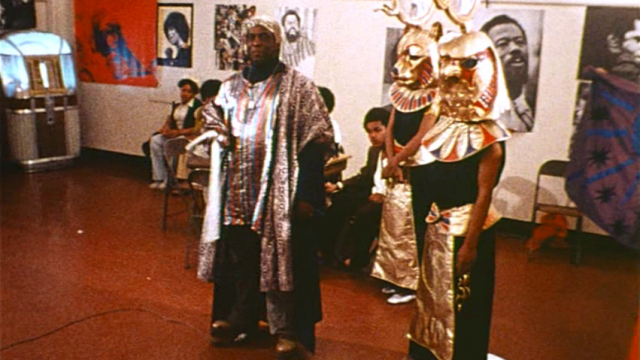“My whole body changed into something
else. I landed on a planet that I identified as Saturn.” - Sun Ra
The Museum of
African Diaspora (MOAD) and The Contemporary Jewish Museum recently held a 40th
anniversary screening of jazz theorist and philosopher Sun Ra’s 1974
science-fiction cosmo-drama Space is The Place. In this complex,
quasi-abstract, weird, militant Blaxploitation, visionary, Afrofuturistic, and
hood-conscious film, Sun Ra takes viewers on a journey from space to Earth in
hope of reclaiming Black minds using interstellar techniques, imagery, and
Black Power consciousness colliding with the fashion sense of Shaft
and Superfly.
The opening introduces
us to a Black man dressed in head-to-toe Parliament-Funkadelic Egyptian regalia:
Sun Ra. Coming from a bluish planet inhabited by Black people, he makes his
entrance on Earth a spaceship evocative of a rubber raft with two blood-shot
red eyeballs plastered on it. Sun Ra’s purpose for coming to Earth is to
recruit more potential Black occupants, and spread a few philosophical lessons.
His purpose becomes clear with his initial question: “Are you ready to alter your destiny?”
Challenged in reclaiming
the African and Black consciousness of his future inhabitants, Ra faces his greatest foe in his quest of
freedom and liberation in the power structure that takes the form of “The
Overseer” and his minion Jimmy Fey. The Overseer is a diabolical pimp and
incarnation of evil in the Black community, in many ways a metaphor for the
overseers from the U.S. slave trade, and Jimmy is reminiscent of present day Blacks
trying to make it in the entertainment industry at any cost. As a ploy, The
Overseer poses himself to be a community leader and a man of charity, while in
fact being the tool of a dominant elite,
hierarchal organization. In addition, to facing The Overseer,
Ra must also combat White
government agents (presumably from the FBI) who are attempting to eliminate
him. From both racial angles, Black and White, Ra must fight to the death for
the fate of the Black race.
The film’s strengths
included Ra’s genius musical skills. With a complex, at times disjointed,
storyline (i.e. cosmic card games, 1940s jazz club vignettes, and proselytizing
at an inner city youth center), Space is The Place features Ra’s 12-member
band, the Arkestra. Clearly heard and on occasion seen in the film, the band
melds heavy, kinetic percussions, an electrifying synthesizer, flamboyant horn,
and a brass section that elevate jazz to a new dimension. For some, the music may
not be enough to stay engaged with the plot. Much like how Sun Ra was difficult
to understand and grasp, Space is The Place incorporates that
confusion with a small opening of clarity. The film is a brilliant statement
that informs audiences about 1970s race.
Space Is The Place is fundamental viewing, particularly for those
interested in jazz or African/African American-diasporic cinema.
Despite poor distribution
and few theater screenings, the 1950s and 1960s futuristic acid jazz soundtrack
made the film an underground classic.
Although this is
Ra’s only film (honestly, he only needed one to preach his philosophy) he also
made strides in the academic arena. Prior to the film, in the Spring 1971
semester, Sun Ra served as an artist-in-residence here at UC Berkeley. He
taught a course in the African American Studies department, “The Black Man in
the Universe,” or “The Black Man in the Cosmos.” While in the Bay (particularly
Oakland), Sun Ra caught the attention of film and television producer Jim
Newman. Listening to Sun Ra's
lectures makes it obvious that the course and the Arkestra band influenced
the film. Ra’s teaching style consisted of lecture for the
first part of the class, then treating the students to keyboard solos or
perhaps Arkestra performances for the second half: the epitome of an informative
and engaging class. Watching and listening to him push the envelope is truly a
cosmic experience.
More than just a dark, super-sonic bootleg 85-minute film, Space
is the Place is a filmic vision laced with Ra’s musical talent, which sought
to expand the consciousness of African Americans in Oakland’s hoods. Combining
elements and references from the King James Bible, Afrocentrism,
science-fiction, occult philosophy, Egyptology, and his own “Arkestra” band,
Sun Ra created futuristic free jazz while telling a story of empowerment and
survival. Space is The Place is a timely film that incorporates amiable
silliness while examining race relations blended with radical paranoia, all in
the context of the Black Panther movement and the post-Vietnam era. Space
is The Place is an enjoyable, imaginative film with a dramatically unique
plot.
*As posted in The Berkeley Graduate








